Related page: “The Personality Profile of 2020 Republican Presidential Candidate Donald Trump” » http://personality-politics.org/donald-trump-2020
The Personality Profile of 2016 Republican Presidential Candidate Donald Trump
August 9, 2015
A psychological analysis of real estate mogul and television celebrity Donald Trump — a contender for the Republican nomination in the 2016 presidential election — by Hannah Hoppe and Aubrey Immelman, Ph.D., at the Unit for the Study of Personality in Politics, revealed that Trump’s predominant personality pattern is Ambitious/self-serving (a measure of narcissism) with secondary features of the Dominant/controlling and Outgoing/gregarious patterns. In summary, Trump’s personality composite can be characterized as a high-dominance charismatic.
————————————
October 2016 update: Donald Trump’s predominant personality patterns are Ambitious/exploitative (a measure of narcissism) and Outgoing/impulsive, infused with secondary features of the Dominant/controlling pattern, and supplemented by a Dauntless/adventurous tendency. This particular personality composite can be labeled amorous narcissism or, in political terms, high-dominance charismatic — charismatic by virtue of the highly elevated primary Ambitious–Outgoing amalgam. [http://digitalcommons.csbsju.edu/psychology_pubs/103/]
January 2017 update: Donald Trump’s core personality-based leadership traits may be summarized as follows: an active-positive presidential character with mobilization — the ability to arouse, engage, and direct the public — as his key leadership asset; an overall leadership style that is distinctively charismatic and nondeliberative; and a high-dominance, extraverted, influential foreign policy orientation. [http://digitalcommons.csbsju.edu/psychology_pubs/107/]
July 2020 update: Donald Trump’s primary personality patterns were found to be Ambitious/self-serving (bordering on exploitative), Dominant/controlling (bordering on aggressive), and Outgoing/gregarious (bordering on impulsive), infused with secondary features of the Dauntless/dissenting pattern. There is suggestive, equivocal evidence of incipient Distrusting/suspicious and Erratic/unstable tendencies emerging during Trump’s time in office. [http://digitalcommons.csbsju.edu/psychology_pubs/129/]
————————————
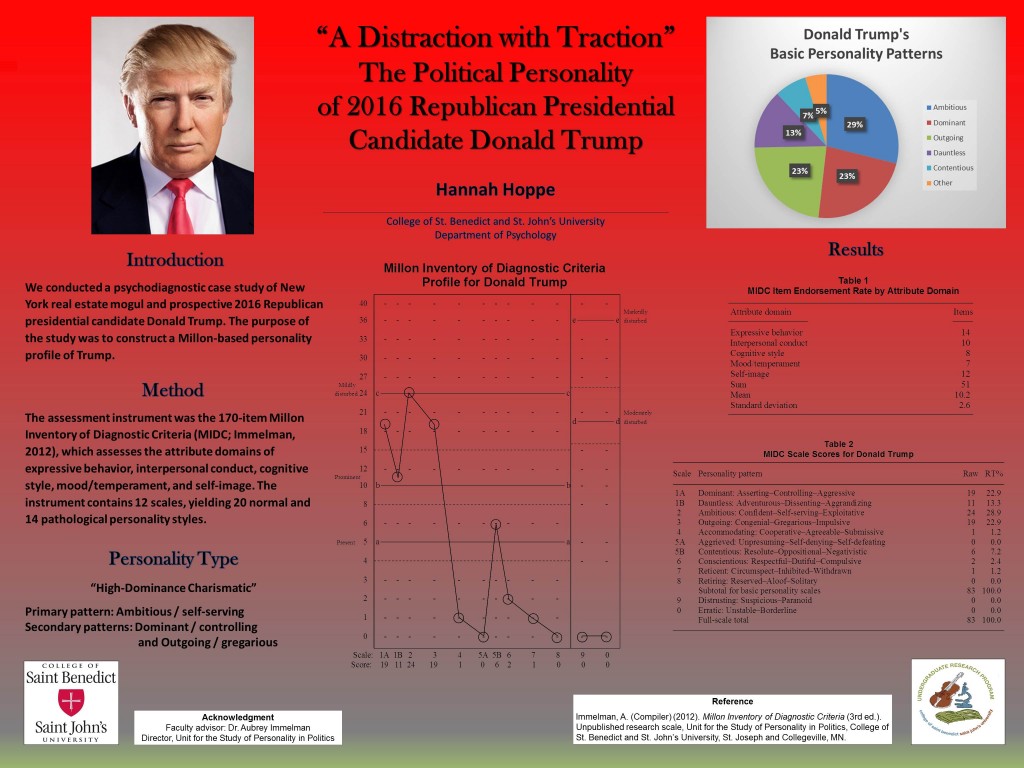
Click on image for larger view
Analysis of the major findings of the 2015 study, as published in an opinion column in the St. Cloud Times
Trump Driven by Narcissistic Dreams of Glory (Hannah Hoppe, St. Cloud Times, Aug. 9, 2015) — A high profile business mogul turned celebrity TV star insults an entire group of people and a nationally recognized war hero, yet expands his lead in the polls in pursuit of the highest office in the land. Anyone not living under a rock knows the candidate in question is Donald Trump — “The Donald.” … Full report
Trump research presented at National Conference on Undergraduate Research
Hannah Hoppe presented her research poster “Personality Profiling of 2016 GOP Presidential Candidates: The Case of Donald Trump” at NCUR 2016, the 30th Anniversary National Conference on Undergraduate Research at the University of North Carolina at Asheville, April 7-9, 2016.
Personality Profiling of 2016 GOP Presidential Candidates:
The Case of Donald Trump
The poster presents the results of an indirect assessment of the personality of Donald J. Trump, Republican presidential contender in the 2016 U.S. presidential election.
The study was conducted from the conceptual perspective of personologist Theodore Millon. Diagnostic information concerning Trump was collected from biographical sources and media reports and synthesized into a personality profile using the Millon Inventory of Diagnostic Criteria (MIDC), which taps the attribute domains of expressive behavior, interpersonal conduct, cognitive style, mood/temperament, and self-image, yielding 34 normal and maladaptive personality classifications congruent with Axis II of DSM–IV.
The personality profile yielded by the MIDC was analyzed on the basis of interpretive guidelines provided in the MIDC and Millon Index of Personality Styles manuals.
Trump’s personality pattern was found to be Ambitious/self-serving (a measure of narcissism), Dominant/controlling, and Outgoing/gregarious. The label high-dominance charismatic serves as shorthand for this particular personality composite, given that political charisma typically is a function of supreme self-confidence in combination with high-energy extraversion and social dominance.
Leaders who score high on both the Ambitious and Outgoing scales are adept at self-promotion and skilled in the art of social influence. Although highly ambitious and driven, they have a tendency to be undisciplined, with a penchant for thinking superficially and speaking in generalities. They are prone to act impulsively and ultimately are more attuned to their own needs than to those of others.
Leaders who score high on the Dominant scale are tough and combative, and are perceived as strong leaders – an important aspect of electability.
The major implication of the study is that it offers an empirically based personological framework for identifying – and direct comparison of his election rivals – Trump’s major strengths and limitations as a candidate and anticipating his likely leadership style as president.
Personal Electability Index (political impact) score
Donald Trump scores extraordinarily high on the Millon Inventory of Diagnostic Criteria-based Personal Electability Index, which has accurately predicted the outcome of every presidential election since 1996.
Following are the PEI calculations for Donald Trump:
Donald Trump: PEI = 62
| Scale: | 1A | 1B | 2 | 3 | 4 | 5A | 5B | 6 | 7 | 8 |
| Score: | 19 | 11 | 24 | 19 | 1 | 0 | 6 | 2 | 1 | 0 |
Scale: 1A = 19; 2 = 24; 3 =19; 6 = 2; 8 = 0
[Extraversion (scale 3) = 19] + [Narcissism (scale 2) = 24] + [Dominance (scale 1A) = 19] – [Introversion (scale 8) = 0] – [Conscientiousness (scale 6) = (2 – 2) = 0] = 62 – 0 = 62
Dysfunctionality adjusted
[Extraversion (scale 3) = 15] + [Narcissism (scale 2) = 15] + [Dominance (scale 1A) = 15] – [Introversion (scale 8) = 0] – [Conscientiousness (scale 6) = (2 – 2) = 0] = 45 – 0 = 45
July 2016 Update
Donald Trump: PEI = 65
| Scale: | 1A | 1B | 2 | 3 | 4 | 5A | 5B | 6 | 7 | 8 |
| Score: | 17 | 9 | 24 | 24 | 0 | 0 | 4 | 0 | 0 | 0 |
Scale: 1A = 17; 2 = 24; 3 = 24; 6 = 0; 8 = 0
[Extraversion (scale 3) = 24] + [Narcissism (scale 2) = 24] + [Dominance (scale 1A) = 17] – [Introversion (scale 8) = 0] – [Conscientiousness (scale 6) = (2 – 2) = 0] = 65 – 0 = 65
Dysfunctionality adjusted
[Extraversion (scale 3) = 15] + [Narcissism (scale 2) = 15] + [Dominance (scale 1A) = 15] – [Introversion (scale 8) = 0] – [Conscientiousness (scale 6) = (0 – 0) = 0] = 45 – 0 = 45
Update: July 2016 Replication/Validity Study
A follow-up replication study of Republican presidential candidate Donald Trump by Anna Faerber and Aubrey Immelman, Ph.D., at the Unit for the Study of Personality in Politics, revealed that Trump’s predominant personality patterns are Ambitious/exploitative (a measure of narcissism) and Outgoing/impulsive, infused with secondary features of the Dominant/controlling pattern, and supplemented by Dauntless/adventurous and Contentious/resolute tendencies. These findings do not differ significantly from those of the original summer 2015 study. The replication study confirms that Trump’s personality composite is best characterized as a high-dominance charismatic — charismatic by virtue of the highly elevated primary Ambitious-Outgoing amalgam.
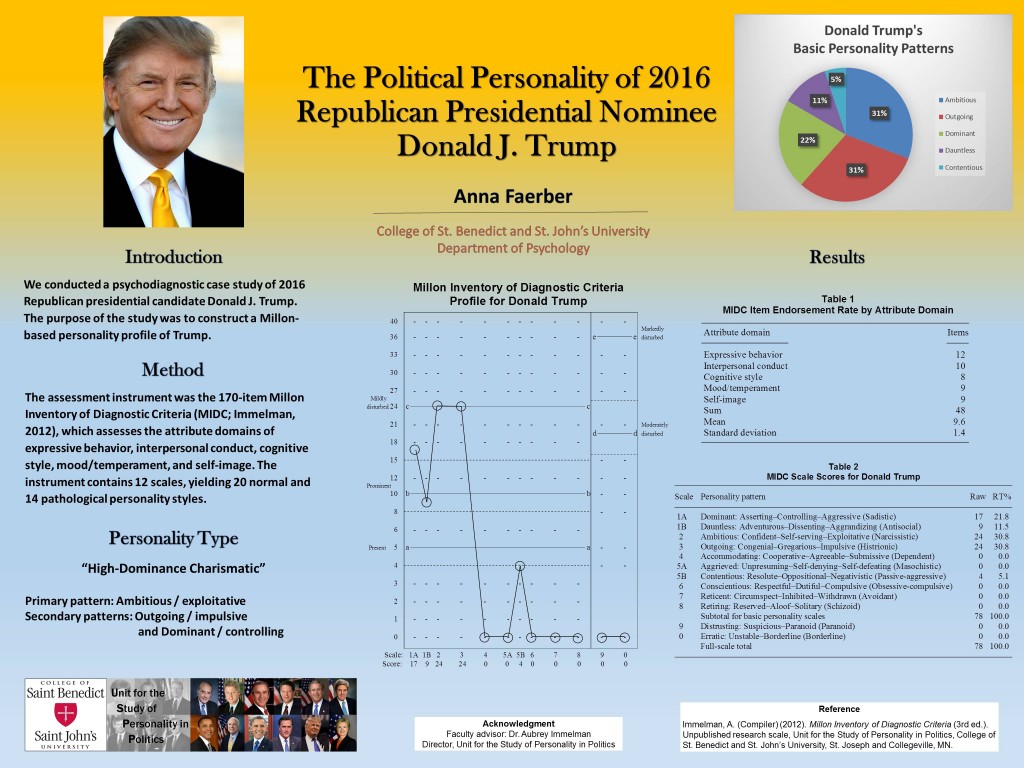
Click on image for larger view
Analysis of the major findings of the 2016 study, as published in an opinion column in the St. Cloud Times
Trump’s Personality Could Win, Except … (Anna Faerber, St. Cloud Times, Aug. 21, 2016) — How could a man no one thought would make it through the primaries clinch his party’s nomination for the highest office in the land? To answer that question, a team of investigators at the Unit for the Study of Personality in Politics at the College of St. Benedict and St. John’s University embarked on a project to develop a psychological analysis of Trump. … Full report
Update: Detailed Psychological Assessments Released (Nov. 4, 2016)
The Unit for the Study of Personality in Politics has released political-psychological assessments of Donald Trump and Hillary Clinton.
Executive Summary: Donald J. Trump
Full text (31 pages)
The Political Personality of 2016 Republican Presidential Nominee Donald J. Trump (Working paper, Unit for the Study of Personality in Politics, St. John’s University/College of St. Benedict, October 2016)
Executive Summary: Hillary Clinton
Full text (34 pages)
The Political Personality of 2016 Democratic Presidential Nominee Hillary Clinton (Working paper, Unit for the Study of Personality in Politics, St. John’s University/College of St. Benedict, October 2016)
Comparison of the Personalities of Hillary Clinton and Donald Trump
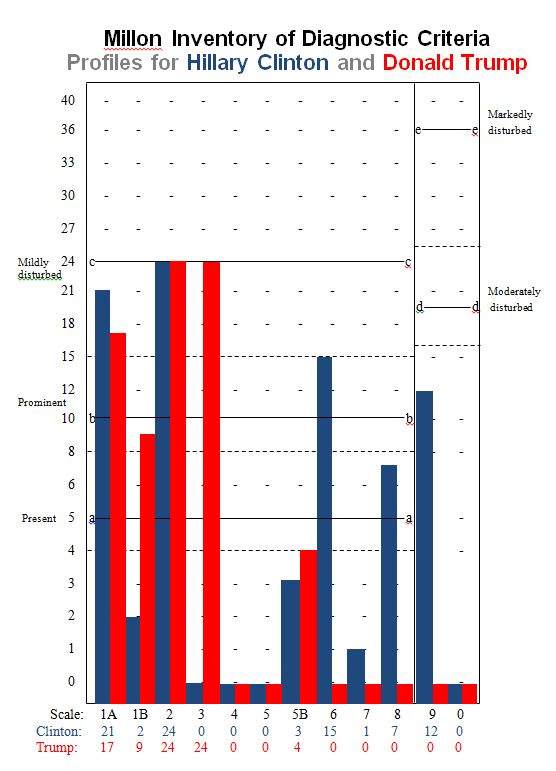
Update: Personality Profile and Leadership Style Analysis of President Donald Trump Presented at International Society of Political Psychology (July 16, 2020)

Aubrey Immelman presents his paper on “The Personality Profile and Leadership Style of U.S. President Donald J. Trump in Office” at the 43rd Annual Scientific Meeting of the International Society of Political Psychology, July 16, 2020.
The Personality Profile and Leadership Style of U.S. President Donald J. Trump in Office. Paper presented at the 43rd Annual Scientific Meeting of the International Society of Political Psychology, Berlin, Germany, July 14-16, 2020. Abstract and link for full-text (71 pages; PDF) download at Digital Commons: http://digitalcommons.csbsju.edu/psychology_pubs/129/
Annie Griebie briefly explains the conceptual framework, methodology, and results of her assessment of President Donald Trump’s personality as revealed in office. (9:39)
Related reports on this site
Donald Trump’s Narcissism Is Not the Main Issue (Aug. 11, 2016)
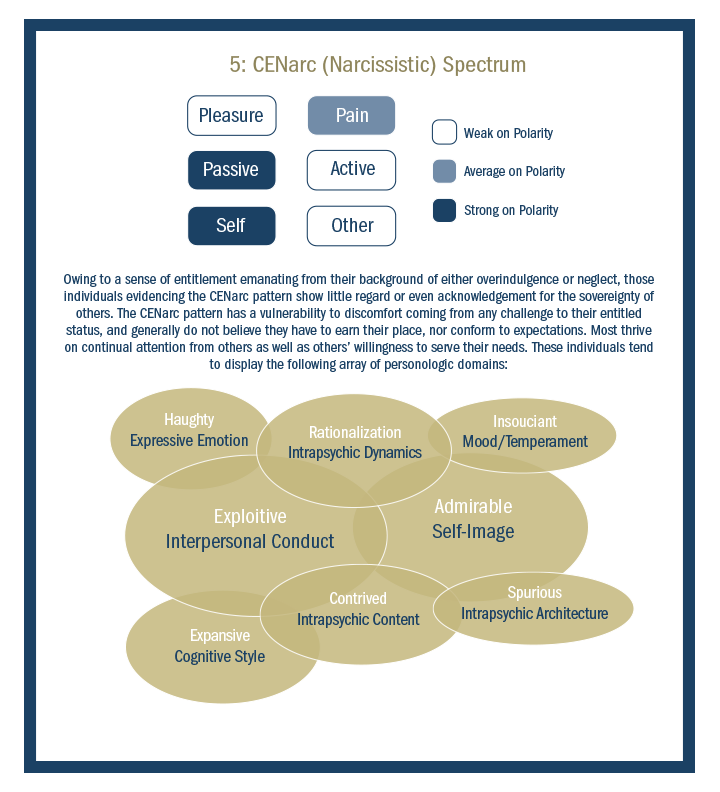
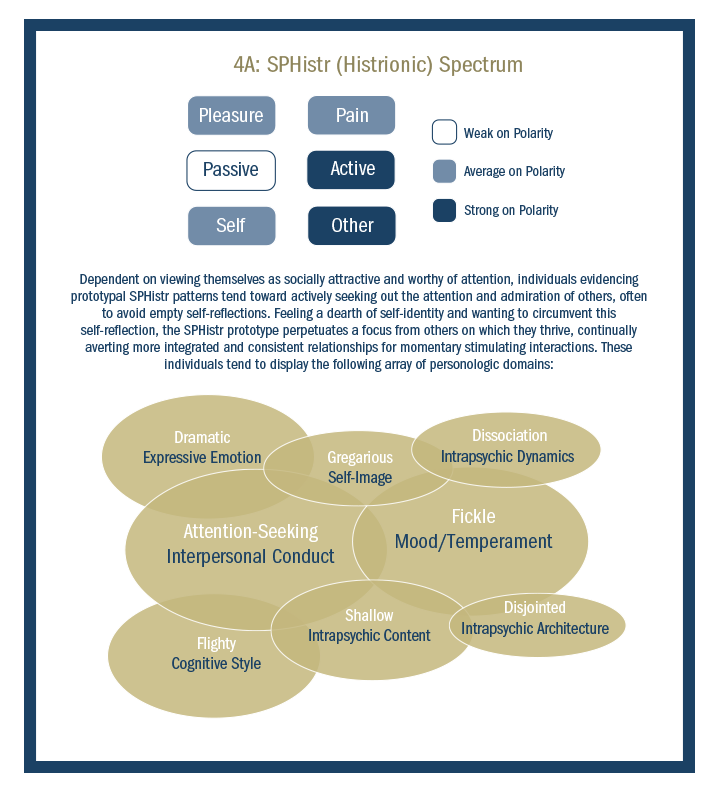
© 2015 MILLON® (Click on images for larger view)
Projecting the Winner of the 2016 Presidential Election: The Personal Electability Index (Feb. 29, 2016)
Why Donald Trump Beats Jeb Bush: The Personal Electability Index (Aug. 23, 2015)
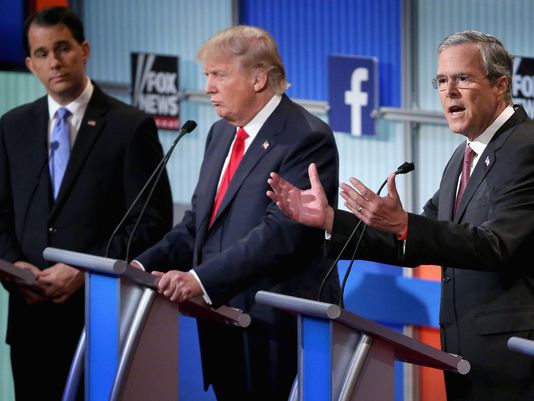
Photo credit: Chip Somodevilla / Getty Images
Comparative Psychological Profiles of the GOP Field (Aug. 6, 2015)
Republican Presidential Candidate Profiles, Polling, and Debates (May 31, 2015)








Republican presidential contenders (from left to right and top to bottom) Ben Carson, Ted Cruz, Carly Fiorina, Mike Huckabee, George Pataki, Rand Paul, Marco Rubio, and Rick Santorum (Photo credits: Gage Skidmore, officeholder official portraits / Wikipedia)
Related reports in the media
What Explains Donald Trump’s Arrogance? (David Gergen, CNN, Aug. 10, 2015) — Donald Trump’s behavior on stage Thursday night and in the days that have followed strike many as unfathomable: How can anyone act so arrogantly and meanly in public life? But in fact, there is a large body of academic and other work that helps to explain. Just Google the literature on “narcissistic leadership” and you will instantly recognize Trump — both his bright and dark sides. … Full report
Trump on the journalist’s couch
The Truth About Donald Trump’s Narcissism (Jeffrey Kluger, Time, Aug. 11, 2015) — The problem with being Trump is the same thing that explains the enormous fame and success of Trump: a naked neediness, a certain shamelessness, an insatiable hunger to be the largest, loudest, most honkingly conspicuous presence in any room. … To call Donald Trump a narcissist is, of course, to state the clinically obvious. There is the egotism of narcissism, the grandiosity of narcissism, the social obtuseness of narcissism. … Their act becomes old, their opponents become bold, and the audience—inevitably—moves onto something else. Trump the phenomenon will surely become Trump the afterthought. He is a man who desperately hungers for respect and attention and who, by dint of that very desperation, will likely wind up with neither. … Full report
The Junk Politics of 2015 (Timothy Egan, New York Times, Aug. 14, 2015) — Normal politics can’t explain Trump. For that you need Freud. Trump fits the classic definition of narcissistic personality disorder. … Full report
Bobby Jindal: Donald Trump is a “narcissist,” “egomaniac”
Dr. Drew Pinsky: Trump may be mentally ill
Dr. Drew talks Trump (“CNN Tonight,” Aug. 1, 2016) — Dr. Drew Pinsky tells Don Lemon that Donald Trump does not fit the stringent legal definition for insanity — but he does show signs of multiple mental illnesses. (6:46)
‘Dr.’ Lawrence O’Donnell diagnoses Donald Trump with narcissistic personality disorder on MSNBC
Trump: the candidate ‘unfit to serve?’ (MSNBC “The Last Word,” Aug. 2, 2016) — Pres. Obama blasted Donald Trump, calling the GOP nominee ‘unfit to serve’ as president. Lawrence O’Donnell speaks with George Simon, E.J. Dionne, and Mark Singer about Trump’s temperament, rhetoric, and personality challenges. (18:20)
95,000 Words, Many of Them Ominous, from Donald Trump (Patrick Healey and Maggie Haberman, New York Times, Dec. 6, 2015) — The New York Times analyzed every public utterance by Mr. Trump over the past week from rallies, speeches, interviews and news conferences to explore the leading candidate’s hold on the Republican electorate for the past five months. The transcriptions yielded 95,000 words and several powerful patterns, demonstrating how Mr. Trump has built one of the most surprising political movements in decades and, historians say, echoing the appeals of some demagogues of the past century. … Full report
Nothing’s Gonna Stop Him Now: Why The GOP Can’t Derail Donald Trump (Lauren Fox, Talking Points Memo, Dec. 9, 2015) — With just two months until the Iowa caucuses, it may be time to recognize the reality that the myth has been obscuring: No strategic intervention is going to stop Trump now. “If anyone is going to kill Trump, it is Trump,” said Allan Lichtman, a history professor at American University and the author of White Protestant Nation: The Rise of the American Conservative Movement. … Full report
It’s Not Chaos. It’s Trump’s Campaign Strategy (Paul Schwartzman and Jenna Johnson, Washington Post, Dec. 9, 2015) — He referred to Mexicans as “rapists,” questioned Sen. John McCain’s status as a war hero, ridiculed the physical appearance of his opponents, falsely claimed that “thousands” in New Jersey cheered as the World Trade Center fell and, this week, called for a ban on Muslims entering the United States. Despite predictions that such searing, divisive rhetoric and the resulting outcry would cripple his campaign, Donald Trump’s insults and controversial proposals have propelled him to the forefront of the 2016 presidential race — and kept him there. … Full report
Trump Ties with Pope Francis in U.S. Poll for Second Most-Admired Man in the World (Nick Gass, Politico, Dec. 28, 2015) – Americans named Hillary Clinton and President Barack Obama as their most admired woman and man in the world in 2015, with Donald Trump earning the same share of admiration as Pope Francis, according to the results of the latest Gallup survey. … On the list of most admired men, Pope Francis and Republican presidential candidate Donald Trump tied for second place with 5 percent each. … Full report
Donald Trump’s strongest supporters: A certain kind of Democrat (Nate Cohn, New York Times, Dec. 31, 2015) – Perhaps above all else, the data shows that Mr. Trump has broad support in the G.O.P., spanning all major demographic groups. He leads among Republican women and among people in well-educated and affluent areas. He even holds a nominal lead among Republican respondents that Civis estimated are Hispanic, based on their names and where they live. … Full report
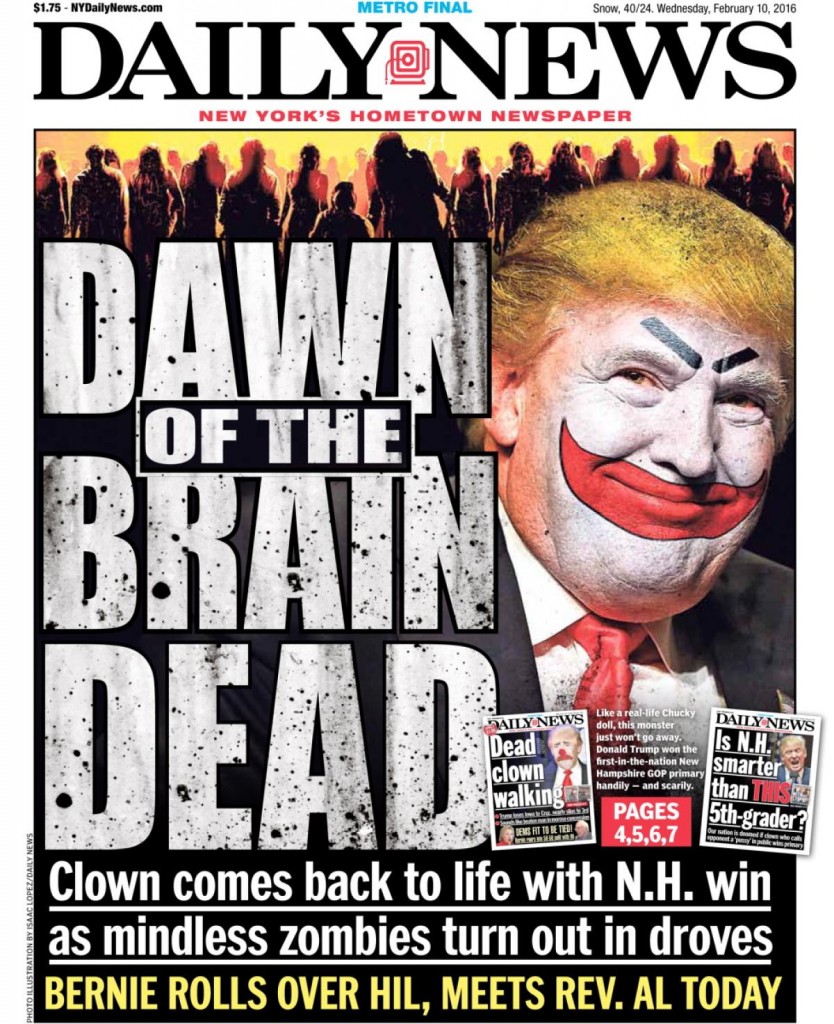
The controversial New York Daily News front page of Feb. 10, 2016.
Questionable Journalism As News Media Editorialize on Trump New Hampshire Victory (Dylan Byers, CNN, Feb. 10, 2016) — As reported by CNN: Huffington Post took a visceral and aggressive approach to Donald Trump’s victory in New Hampshire on Tuesday night, blasting the GOP front-runner as a “racist, sexist demagogue.” … Full report
Minnesota’s GOP Leaders Rattled as Trump’s Support Grows (Patrick Condon, Star Tribune, Mar. 6, 2016)—Republicans at the Minnesota caucuses handed [Donald] Trump his only third-place finish, living up to the state’s history of going its own way politically. Unfortunately for the Republicans who voted for Sens. Marco Rubio of Florida or Ted Cruz of Texas, they still stand a good chance of getting stuck with Trump. … Full report
Republican Leaders Map a Strategy to Derail Donald Trump (Alexander Burns and Jonathan Martin, New York Times, Mar. 19, 2016) — Republican leaders adamantly opposed to Donald J. Trump’s candidacy are preparing a 100-day campaign to deny him the presidential nomination, starting with an aggressive battle in Wisconsin’s April 5 primary and extending into the summer, with a delegate-by-delegate lobbying effort that would cast Mr. Trump as a calamitous choice for the general election. … Full report
An Open Letter to Trump Voters from His Top Strategist-Turned-Defector (Stephanie Cegielski, xoJane, Mar. 28, 2016) — Even Trump’s most trusted advisors didn’t expect him to fare this well. Almost a year ago, recruited for my public relations and public policy expertise, I sat in Trump Tower being told that the goal was to get The Donald to poll in double digits and come in second in delegate count. That was it. … Full report
5/26/2016 Breaking News
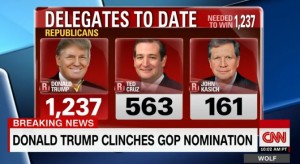
Click on image for larger view

In this May 24, 2007, file photo, Donald Trump is profiled against his 92-story Trump International Hotel & Tower during a news conference on construction progress in Chicago. (Photo credit: Charles Rex Arbogast / AP)
For Trump, It’s About America’s Ego — And His Own (Nancy Benac, Associated Press, Jul. 13, 2016) — Donald Trump was angry: A reporter had the gall to suggest that ego was behind his purchase of New York’s famed Plaza Hotel. When he thought about it, though, he decided it was true — and admitted as much in a big, big way. …Full report
Donald Trump Accepts Presidential Nomination
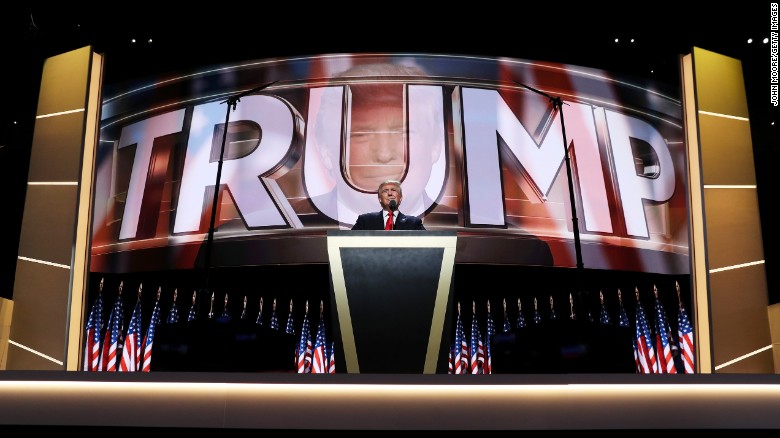
Donald Trump accepts the Republican Party’s nomination for president on Thursday, July 21, 2016 at the Republican National Convention in Cleveland. (Photo credit: John Moore / Getty Images)
By Stephen Collinson
![]()
July 22, 2016
Excerpts
Donald Trump conjured a dire picture Thursday of an America sliding deeper into poverty, violence and corruption and declared himself the only person who could avert disaster.
Accepting the Republican nomination in Cleveland, the billionaire twice pledged to be a “voice” for working Americans, restore law and order and to confound elites and doubters by winning the White House in November. …
Trump, whose unpredictable campaign has broken every rule of politics, portrayed America as a broken nation that only he can fix. …
Trump’s lengthy address — clocking in at one hour and 15 minutes — was the most crucial moment yet in his transformation from a brash tycoon and reality star with a sometimes vulgar tongue to a politician on the cusp of the presidency with an expansive vision of disruptive change. …
Donald Trump’s speech at the Republican convention, as prepared for delivery
Donald Trump is a Unique Threat to American Democracy
Donald Trump addressed the GOP convention in Cleveland, Ohio, July 21, 2016. The Republican presidential candidate spoke for more than one hour; we broke it down to less than five minutes. (Deirdra O’Regan / The Washington Post)
By Editorial Board
![]()
July 22, 2016
Excerpts
DONALD J. TRUMP, until now a Republican problem, this week became a challenge the nation must confront and overcome. The real estate tycoon is uniquely unqualified to serve as president, in experience and temperament. He is mounting a campaign of snarl and sneer, not substance. To the extent he has views, they are wrong in their diagnosis of America’s problems and dangerous in their proposed solutions. Mr. Trump’s politics of denigration and division could strain the bonds that have held a diverse nation together. His contempt for constitutional norms might reveal the nation’s two-century-old experiment in checks and balances to be more fragile than we knew.
Any one of these characteristics would be disqualifying; together, they make Mr. Trump a peril. We recognize that this is not the usual moment to make such a statement. In an ordinary election year, we would acknowledge the Republican nominee, move on to the Democratic convention and spend the following months, like other voters, evaluating the candidates’ performance in debates, on the stump and in position papers. This year we will follow the campaign as always, offering honest views on all the candidates. But we cannot salute the Republican nominee or pretend that we might endorse him this fall. A Trump presidency would be dangerous for the nation and the world.
Why are we so sure? Start with experience. It has been 64 years since a major party nominated anyone for president who did not have electoral experience. …
The lack of experience might be overcome if Mr. Trump saw it as a handicap worth overcoming. But he displays no curiosity, reads no books and appears to believe he needs no advice. In fact, what makes Mr. Trump so unusual is his combination of extreme neediness and unbridled arrogance. He is desperate for affirmation but contemptuous of other views. …
Given his ignorance, it is perhaps not surprising that Mr. Trump offers no coherence when it comes to policy. …
Most alarming is Mr. Trump’s contempt for the Constitution and the unwritten democratic norms upon which our system depends. He doesn’t know what is in the nation’s founding document. …
Worse, he doesn’t seem to care about its limitations on executive power. …
Mr. Trump is a unique and present danger.
Full editorial at the Washington Post
The True Story: Donald Trump Did Not Mock a Reporter’s Disability

By Catholics 4 Trump
July 27, 2016
At the Democratic National Convention speakers are repeating the claim, amplified ad nauseam by the left and establishment GOP opponents over the past year, that Donald Trump mocked the disability of New York Times reporter, Serge Kovaleski. This accusation has served as a very convenient tool to both smear Trump’s character and to avoid having to confront him on substantive political issues. But is it true? Here is the story the media is not telling you. …
11/27/2016
A Question of Temperament: Donald Trump’s Fitness to Lead
12/11/2016
New York Times columnist Frank Bruni assesses Donald Trump’s personality
1/23/2017
What Kind of President? Trump, ‘High-Dominance Charismatic’

President-elect Donald Trump leans over to talk with Vice President-elect Mike Pence during the 58th Presidential Inauguration at the U.S. Capitol in Washington, Friday, Jan. 20, 2017. (Photo: Andrew Harnik / AP via St. Cloud Times)
By Aubrey Immelman
St. Cloud Times
January 20, 2017
On Friday, Donald J. Trump was inaugurated as the 45th president of the United States in what, for some, was not so much an occasion for celebration as one of trepidation. In fact, no less than his predecessor painted Trump during the election campaign as “not qualified to be president.”
That raises the question: Does Trump have what it takes, in his words, to “Make America Great Again?” With no political track record in elected office, it’s difficult indeed to anticipate how Trump will lead.
Window to the future
Political psychology offers a window to the future. That’s because personality — a person’s ingrained behavior patterns — dictates how that individual will act over time in a broad variety of situations. In short, accurate personality assessment allows us to anticipate leadership behavior.
As previously reported (“Trump’s personality raises red flags,” Nov. 26, 2016), a psychological study of Trump conducted at the Unit for the Study of Personality in Politics revealed that Trump’s predominant personality patterns are outgoing/impulsive and ambitious/exploitative (a measure of narcissism), infused with secondary features of the dominant/controlling pattern and low conscientiousness — a personality composite characterized as a “high-dominance charismatic.”
Because presidential behavior is dictated as much by circumstances and structural constraints on the power of the presidency as by personality — frequently more so — personality analysis can go only so far, painting presidential prospects in broad strokes rather than minute detail. In short, personality can point only to the general tenor of a prospective presidency.
Trump’s likely leadership style
As a “high-dominance charismatic” Trump assumes the mantle of leadership with a Clintonian combination of extraversion and self-confidence, buttressed by a level of dominance not seen since Lyndon B. Johnson. In addition, he is practically devoid of his predecessor’s accommodating disposition (“Obama is a ‘confident conciliator,’ ” Sept. 8, 2012) or George H.W. Bush’s prudent conscientiousness.
Trump’s psychological profile raises the following generalized expectancies regarding his leadership style as president:
- Leadership motivation: power, self-validation, pragmatism. As an extraordinarily confident individual with an unshakable belief in his own talents, leadership ability, and potential for success, a quest for power will be the prime motivator for Trump’s leadership behavior, punctuated by a need to control situations and dominate adversaries. Furthermore, Trump’s outgoing nature suggests concern with popular approval and a striving for self-validation to affirm his inflated self-esteem. In addition, he will likely be more pragmatic than ideological to consummate his political objectives.
- Leadership orientation: goal directed, loyalty expected. Given his supreme self-confidence and high dominance, Trump will likely be more goal directed than relationship oriented. As a task-oriented leader, Trump will not permit the maintenance of good relations to stand in the way of goal achievement. This orientation will be offset to some extent by Trump’s outgoing tendencies which, in addition, will also prime him to place a high premium on loyalty among his advisors and members of his administration.
- Job performance: energy dynamo. Big egos have a strong drive to prove themselves. Thus, Trump can be expected to be tireless in the amount of effort invested in carrying out the duties of his office. This tendency will be reinforced by strong power motivation stemming from high dominance and boundless energy derived from his extraverted, outgoing personality.
- Managerial style: advocate, not consensus builder. In organizing and managing the decision-making process, Trump will be heavy on self-promotion and persuasion, making him more of an advocate for his policy agenda than a consensus builder or an arbitrator.
- Dealing with Congress: competitive, controlling. In dealing with Congress, Trump will most likely act in a competitive and controlling manner — though he certainly is capable of behaving in a cooperative, harmonious fashion if he believes it will further his own self-interest.
- The people and the press: active, uncooperative. In relating to the public, outgoing, confident leaders such as Trump typically are active and engaged, articulating and defending their policies in person rather than relying on surrogates and proxies. This tendency will be reinforced by Trump’s dominant, strong-willed, outspoken personality and fueled by his extraversion, which will feed his preference for direct engagement with the public. As for media relations, Trump will maintain a measure of harmony with the press, to the extent he feels he can call the shots. However, the likelihood of a highly critical press, in conjunction with Trump’s sensitivity to personal slights, portends a relatively closed relationship with the media characterized by a lack of cooperation that could quickly escalate to outright hostility.
Rash words may be par for the course in the heat of political campaigns and calling Trump unqualified may be best consigned to that particular chapter in the annals of presidential history. What cannot be denied is that President Trump counts among the least experienced incumbents in recent memory. Time will tell if Trump is equal to the daunting task he now faces in this new chapter of his illustrious, if checkered, career — and whether personality will be destiny.
This is the opinion of Aubrey Immelman, associate professor of psychology at the College of St. Benedict and St. John’s University, where he directs a faculty-student collaborative research program in political psychology, the Unit for the Study of Personality in Politics. Immelman specializes in the psychological assessment of presidential candidates and world leaders.
2/20/2017
Russia Compiles Psychological Dossier on Trump for Putin
By Bill Neely
![]()
February 20, 2017
MOSCOW — A dossier on Donald Trump’s psychological makeup is being prepared for Russian President Vladimir Putin.
Among its preliminary conclusions is that the new American leader is a risk-taker who can be naïve, according to a senior Kremlin adviser.
Trump “doesn’t understand fully who is Mr. Putin — he is a tough guy,” former Deputy Foreign Minister Andrei Fedorov told NBC News.
Added content: Psychological Profile of Vladimir Putin
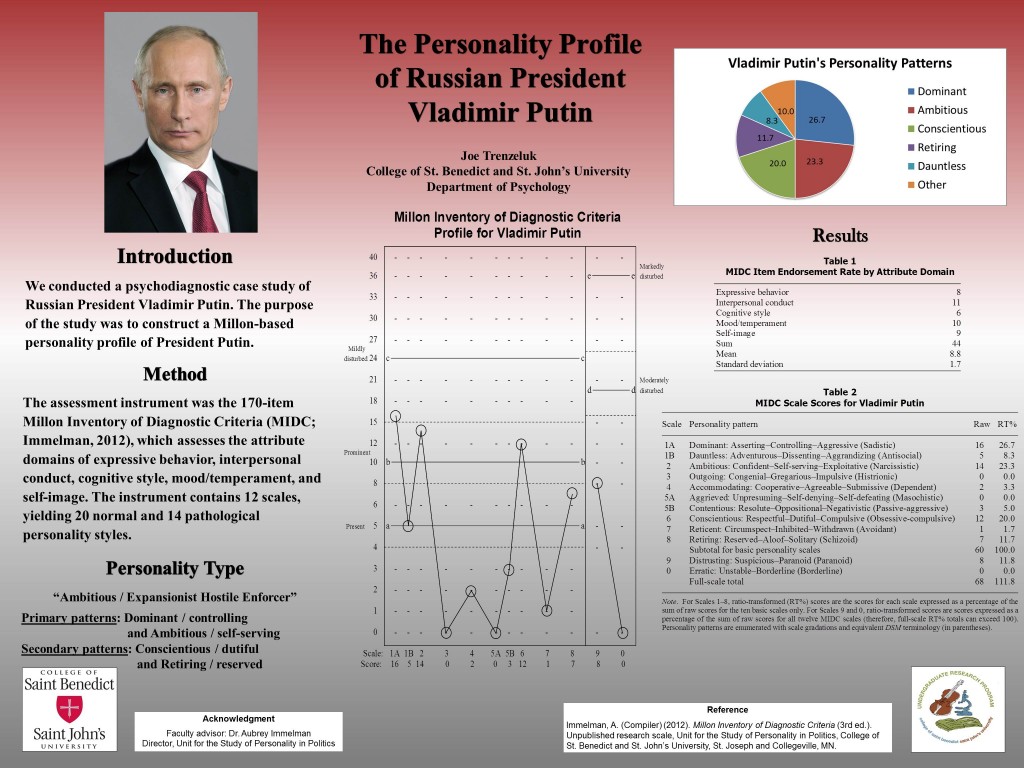
Click on image for larger view
The file is being compiled by retired diplomats and some of Putin’s staff, he added.
The attempt to get inside the U.S. president’s mind is aimed at helping Putin plan for his first meeting with America’s new leader, the date for which is yet to be decided.
“Very serious preparatory work is going on in the Kremlin, including a paper — seven pages — describing a psychological portrait of Trump [link added], especially based on this last two to three months, and the last weeks,” added Fedorov, who said he has known Trump since 2000.
The dossier was being revised regularly, he said, adding that many in the Kremlin believed that Trump viewed the presidency as a business.
Fedorov added: “Trump is not living in a box — he is living in a crowd. He should listen to the people around him especially in the areas where he is weak.”
It is normal for any president or leader to be fully briefed before entering negotiations for the first time with a rival leader, but preparing a detailed dossier on the mind and instincts of a U.S. leader is unusual. …
2/20/2017
Is Donald Trump a “Malignant Narcissist”?
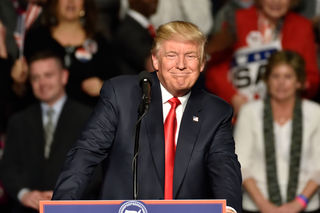
Photo: Evan El-Amin / Shutterstock via Psychology Today
Psychology Today recently (Jan. 31, 2017) reported:
In the several days since psychologist John Gartner posted a petition on Facebook declaring that Donald Trump must be removed from office because he has “a serious mental illness that renders him psychologically incapable of competently discharging the duties of President of the United States,” more than 18,000 psychologists, psychiatrists, and other mental health professionals have signed their agreement.
Gartner, a psychologist in private practice in Baltimore and New York, author of a psychobiography of Bill Clinton, and a former instructor in psychiatry at Johns Hopkins, contends that Trump “manifestly” meets the DSM-published criteria for at least three personality disorders: narcissistic personality disorder (NPD), antisocial personality disorder, and paranoid personality disorder. They are a “toxic brew” that in his view not only make Trump “dangerous” but add up to “malignant narcissism,” not a diagnosis formalized in the Diagnostic and Statistical Manual [of mental disorders, published by the American Psychiatric Association] but a label coined by the German-born psychologist and psychoanalyst Erich Fromm.
An indirect personality assessment of Donald Trump conducted 2015–2016 from the conceptual perspective of psychologist Theodore Millon, employing the Millon Inventory of Diagnostic Criteria (MIDC), which is congruent with Axis II of DSM–IV, revealed that Trump’s predominant personality patterns are Ambitious/exploitative (Scale 2: a measure of narcissistic tendencies) and Outgoing/impulsive (Scale 3: a measure of histrionic tendencies), infused with secondary features of the Dominant/controlling pattern (Scale 1A: a measure of sadistic tendencies) and supplemented by a Dauntless/adventurous tendency (Scale 1B: a measure of antisocial and sensation-seeking tendencies).
The study found no empirical evidence of a Distrusting personality pattern (Scale 9: a measure of paranoid tendencies) — an integral component of malignant narcissism, a severely disturbed personality disorder characterized by narcissistic grandiosity, self-absorption, and lack of empathy; no constraints of conscience (an antisocial tendency); a paranoid orientation; and unconstrained aggression (sadism). Notably, Scale 1A (sadistic) and Scale 1B (antisocial) also failed to reach the MIDC scale elevation threshold of 24 required for inferring the existence of a personality disorder. Consequently, it cannot be concluded that Donald Trump is a malignant narcissist.
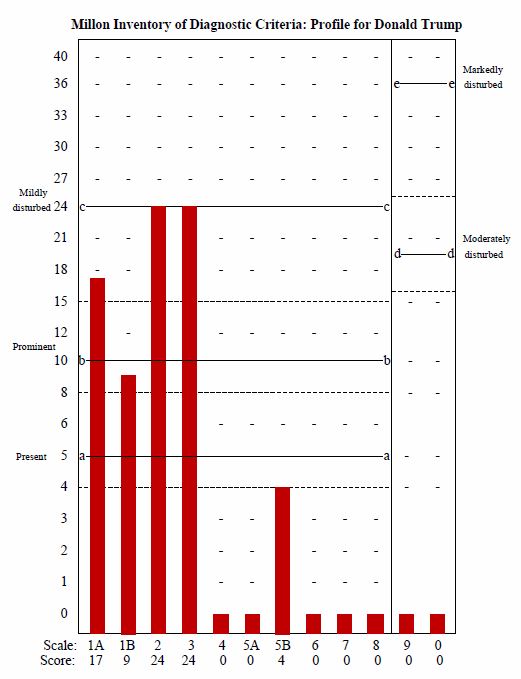
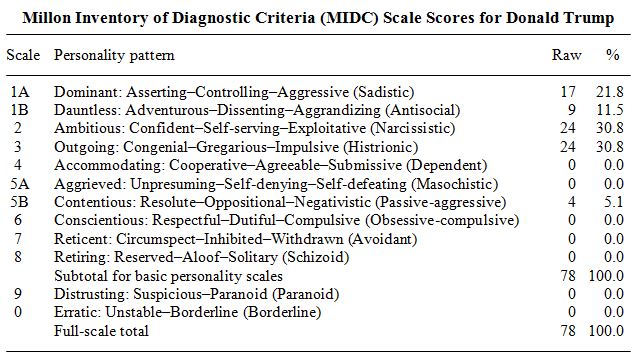
According to the Psychology Today report, psychiatrist Allen Frances — who helped write the criteria for personality disorders — views “public diagnoses being bandied about” as inaccurate and missing the point, because “they ignore the criterion that symptoms must be causing distress and impairment.” Donald Trump, according to Frances, “causes distress to others, not to himself … [and] is rewarded for his behaviors.”
————
Update
Trump’s mental health: ‘The elephant in the room’ (“The Last Word with Lawrence O’Donnell,” MSNBC, Feb. 23, 2017) — As psychologists and psychiatrists continue to warn about President Trump’s mental health, the Columbia Journalism Review called Trump’s mental health “the elephant in the room.” Lee Siegel, who wrote the CJR column, and Dr. Lance Dodes join Lawrence. (Duration: 7:04)
Counterpoint

The Case for Donald Trump’s Mental Fitness

Analysis by Chris Cillizza, CNN Editor-at-large
![]()
January 4, 2018
Excerpts
In the wake of three days of erratic behavior and amid the controversy caused by a book suggesting he is forgetful and dismissed by many who work for him, questions of President Donald Trump’s mental competence are everywhere. …
Trump is who he has always been.
Think about the sorts of behaviors that Trump’s critics point to as examples of his lack of mental competence or deteriorating mental state:
- He is impetuous
- He is quick to anger
- He appears unengaged in details
- He keeps erratic hours
- He says things that are probably false
- He has an exaggerated — and grandiose — vision of his own life
- He punishes enemies
There are others, of course. But these, I think, broadly cover the competence critique made against Trump.
Now, go back over that list. And ask yourself whether any of those behaviors are new since Trump has been elected president.
While you’re doing that, let me remind you that Trump did the following things as either a candidate or private citizen:
- Impersonated a young publicist within the Trump Organization to leak flattering details about his own personal life to the New York tabloids.
- Spent several years pursuing the totally debunked idea that President Barack Obama wasn’t born in the United States
- Made a series of lewd comments about women caught on tape by “Access Hollywood” (and then argued the tape might be a fake)
- Insisted that 3-5 million votes were cast illegally in the 2016 election
- Suggested Ted Cruz’s father might have been involved in the assassination of John Kennedy
Those are the ones I came up with off the top of my head. There are scores of others examples just like them. …
Trump is today who he has been the entirety of his adult life. …
The Trump on the campaign trail — full of bravado, fiercely unapologetic, dramatic, obsessed with victimization — was the Trump of the wheeling-and-dealing 1980s. It was the Trump of the reality TV show years. And it is the Trump of the White House.
The obvious pushback to this argument is that simply because Trump’s behavior isn’t inconsistent with who he has been his entire life doesn’t mean that he is mentally well enough to hold the office of the presidency.
Fair enough. I am not a psychologist or a psychiatrist, so diagnosing what, if anything, has long been wrong with Trump mentally (and if that impedes his ability to do the job) is well beyond my skill set.
But what seems clear — at least to me — is that the case for some sort of mental deterioration from Trump since he has been in office simply isn’t there. …
Read the full story at CNN.com
Related report
Donald Trump’s Narcissism Is Not the Main Issue (Aug. 11, 2016)


© 2015 MILLON® (Click on images for larger view)
April 28, 2018
Students Present Research at Scholarship Day
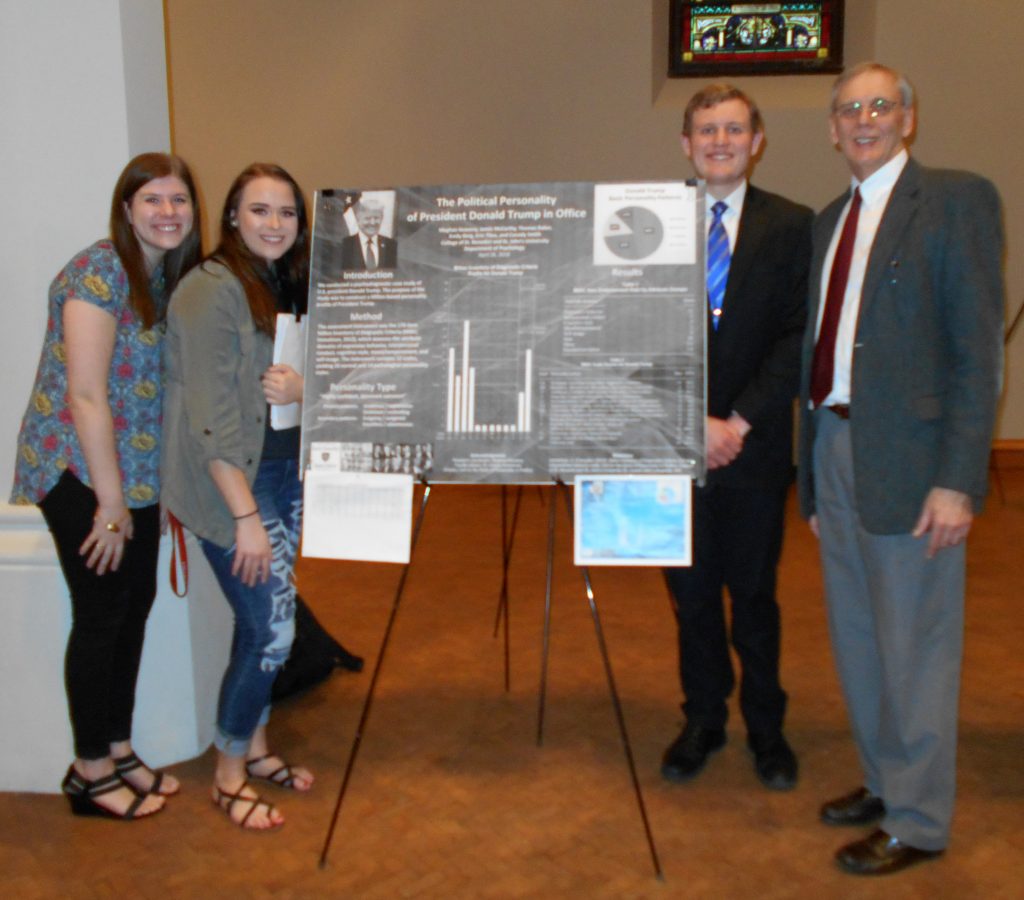
Emily Berg, Cassidy Smith, and Thomas Baker (pictured with faculty research moderator Dr. Aubrey Immelman) presented their research project, “The Political Personality of President Donald Trump in Office,” at the 18th annual Scholarship & Creativity Day, April 26, 2018, in the Great Hall at St. John’s University in Collegeville, Minn.
COLLEGEVILLE, Minn. (April. 27, 2018) — Psychological profiles of U.S. President Donald Trump and North Korean Supreme Leader Kim Jong-un were presented on April 26, 2018, at “Celebrating Scholarship and Creativity Day,” an annual event to recognize students, faculty, and staff who have undertaken significant research, scholarship, or creative works during the past academic year at St. John’s University and the College of St. Benedict.
Undergraduate students in a Personality Psychology course at the colleges conducted the research under the auspices of the Unit for the Study of Personality in Politics, directed by Aubrey Immelman, Ph.D., associate professor of psychology.
Biographical and life history data concerning the candidates were collected from media reports and synthesized into personality profiles using the third edition of the Millon Inventory of Diagnostic Criteria (MIDC). Following are abstracts of the poster presentations.
——————————————————
The Political Personality
of President Donald Trump in Office
Meghan Keaveny, Jamie McCarthy, Thomas Baker, Emily Berg, Erin Titus, Cassidy Smith, and Aubrey Immelman
Unit for the Study of Personality in Politics
April 26, 2018
Abstract
A remote psychological assessment of Donald Trump in his capacity as president of the United States was conducted from 2017 to 2018. Psychodiagnostically relevant data regarding Trump was collected from biographical sources and media reports published after his inauguration as president on January 20, 2017, and synthesized into a personality profile using the Millon Inventory of Diagnostic Criteria (MIDC), which yields 34 normal and maladaptive personality classifications congruent with DSM–III–R, DSM–IV, and DSM–5. The primary purpose of this study, which will continue throughout the Trump presidency, was to compare Trump’s public personality in office to his personality prior to assuming political office, as assessed during the 2016 presidential election cycle.
The personality profile yielded by the MIDC was analyzed in accordance with interpretive guidelines provided in the MIDC and Millon Index of Personality Styles manuals. Trump’s primary personality patterns were found to be Ambitious/exploitative and Dominant/controlling, infused with secondary Outgoing/congenial and Dauntless/adventurous features, possibly supplemented by a slight Erratic/unstable tendency.
In summary, Trump can be characterized as a highly confident, dominant extravert, based on the amalgam of Ambitious, Dominant, and Outgoing patterns in his overall personality profile.
Ambitious individuals are bold, competitive, and self-assured; they easily assume leadership roles, expect others to recognize their special qualities, and often act as though entitled. Dominant individuals enjoy the power to direct others and to evoke obedience and respect; they are tough and unsentimental and often make effective leaders. Outgoing individuals are dramatic attention‑getters who thrive on being the center of social events, go out of their way to be popular with others, have confidence in their social abilities, tend to be impulsive and undisciplined, and become easily bored — especially when faced with repetitive or mundane tasks. Dauntless individuals tend to flout tradition, dislike following routine, sometimes act impulsively and irresponsibly, and are inclined to elaborate on or shade the truth and skirt the law.
Trump’s major personality strengths in a political role are his confident assertiveness, personal charisma, and persuasiveness. His major personality-based shortcomings are of a temperamental nature: impulsiveness and a lack of emotional restraint and self-discipline.
May 24, 2019
President Trump as perceived by his detractors: “A Very Stable Genius” parody (video; 3:12)
Related reports
The Personality Profile and Leadership Style of U.S. President Donald J. Trump in Office. Paper presented at the 43rd Annual Scientific Meeting of the International Society of Political Psychology, Berlin, Germany, July 14-16, 2020. Abstract and link for full-text (71 pages; PDF) download at Digital Commons: http://digitalcommons.csbsju.edu/psychology_pubs/129/
The Leadership Style of U.S. President Donald J. Trump. Working paper, Unit for the Study of Personality in Politics, St. John’s University/College of St. Benedict, January 2017. Abstract and link for full-text (14 pages; PDF) download at Digital Commons: http://digitalcommons.csbsju.edu/psychology_pubs/107/
The Political Personality of 2016 Republican Presidential Nominee Donald J. Trump. Working paper, Unit for the Study of Personality in Politics, St. John’s University/College of St. Benedict, October 2016. Abstract and link for full-text (31 pages; PDF) download at Digital Commons: http://digitalcommons.csbsju.edu/psychology_pubs/103/
Alternate link to “The Personality Profile of 2016 Republican Presidential Candidate Donald Trump” » http://www.immelman.us/news/the-personality-profile-of-2016-republican-presidential-candidate-donald-trump/
Donald Trump’s official campaign website


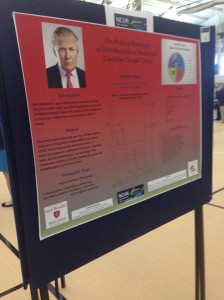

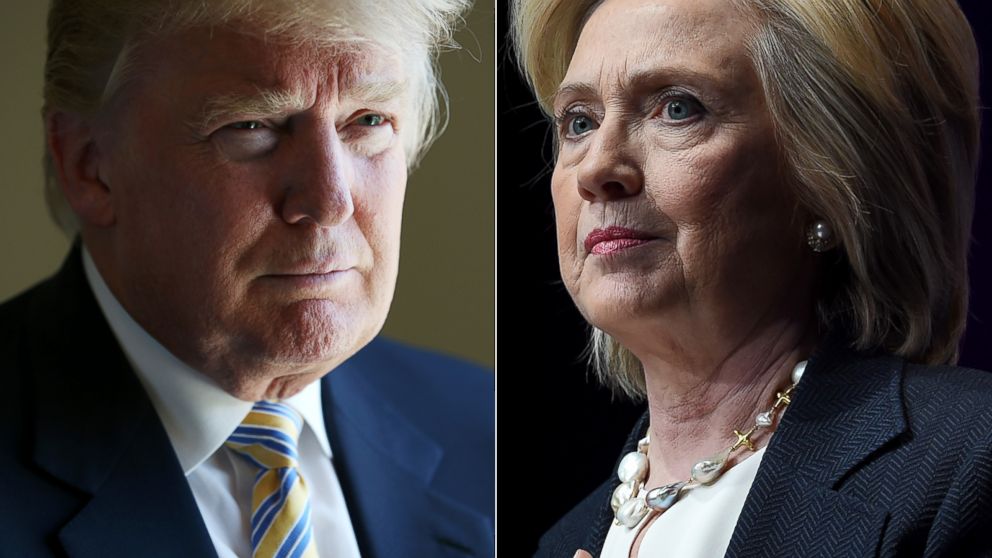
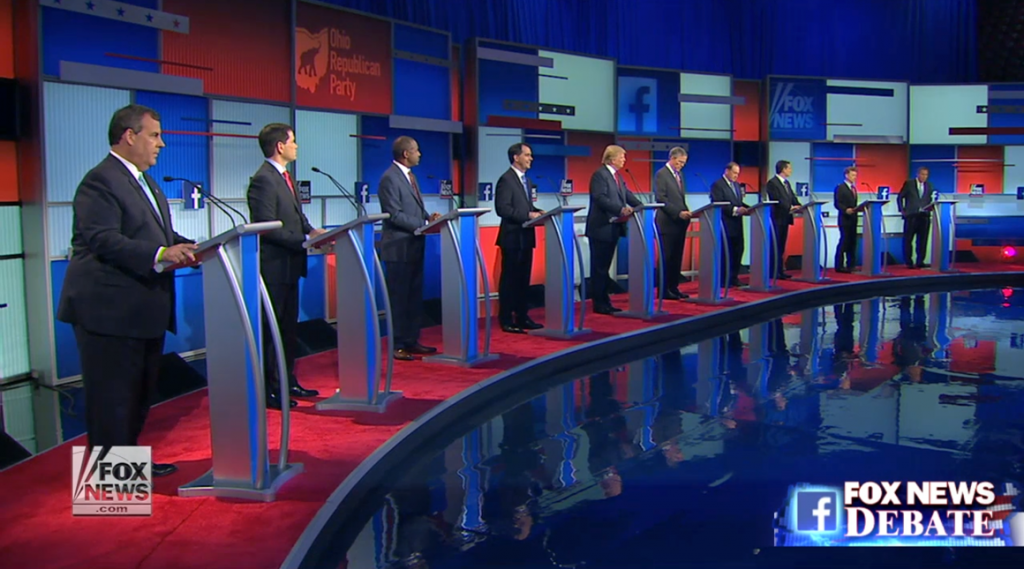
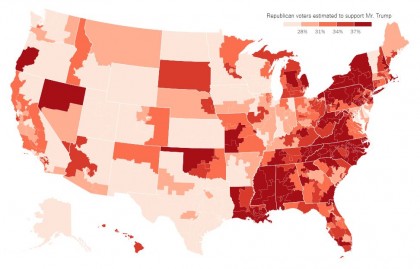
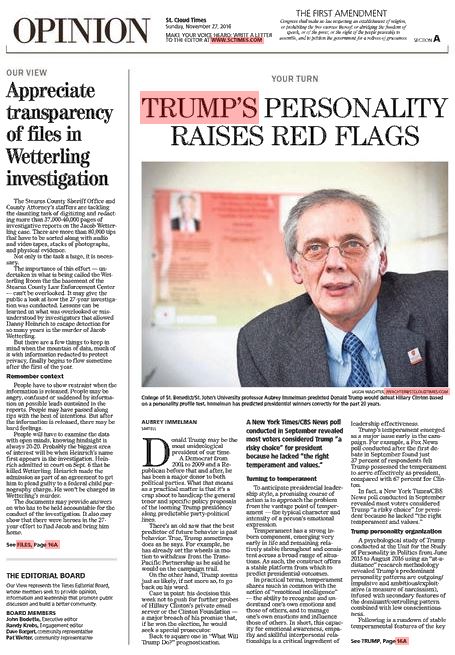
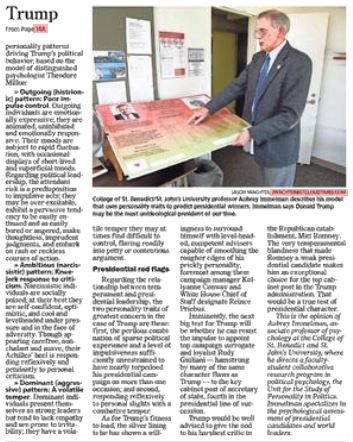
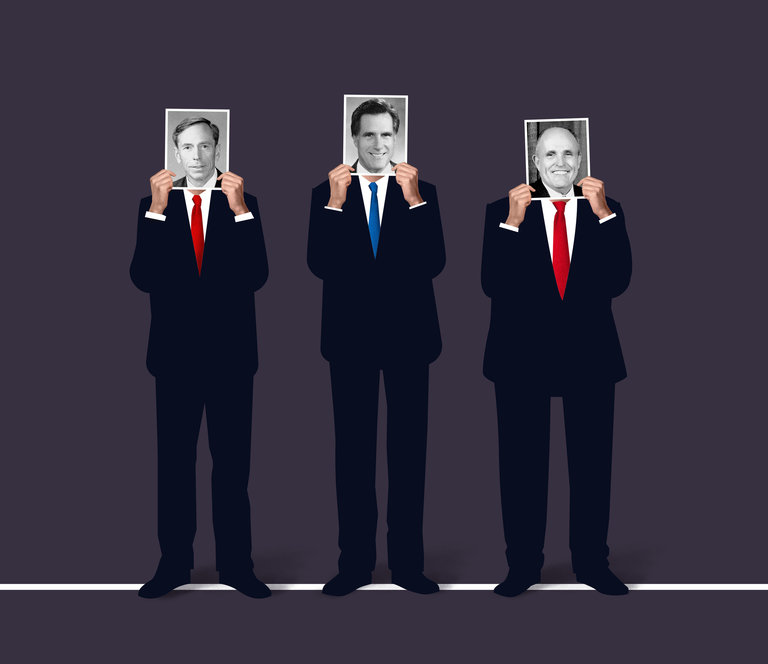
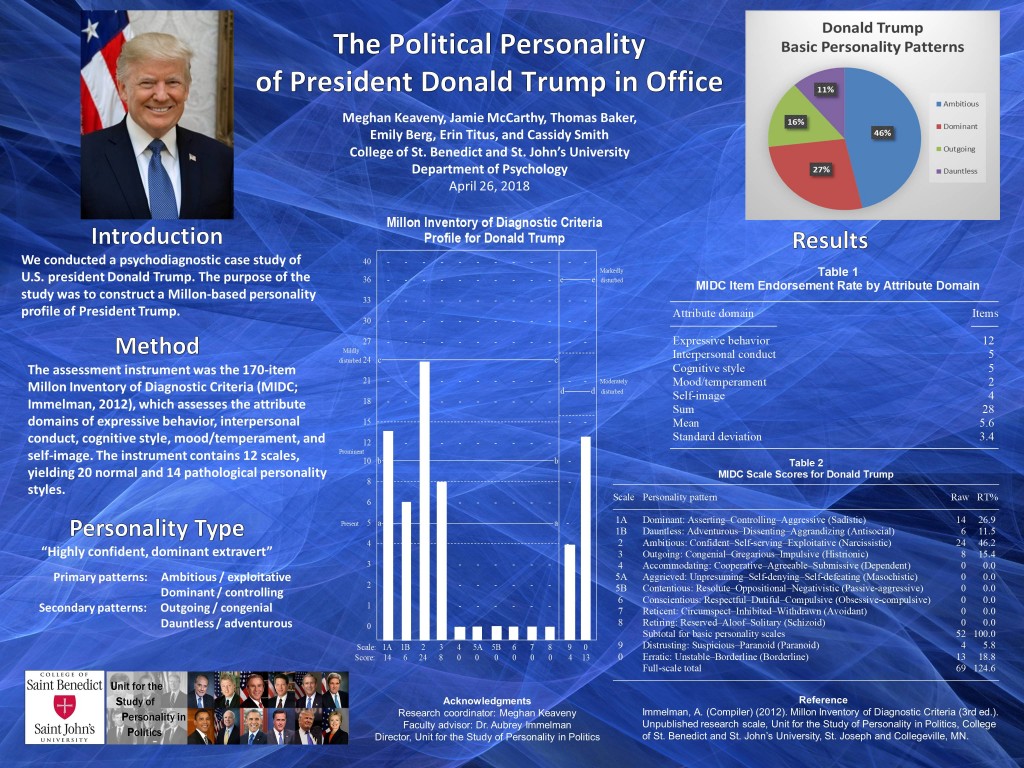









Follow Aubrey Immelman